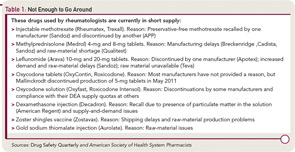Lack of Notice a Problem
Physicians in rheumatology and other fields say that they often are not notified about a drug shortage before their patients experience it themselves.
Dr. Fudman and others say that they get their information about shortages, including the cause and the expected date when the drug will again be easily available, from the American Society of Health-System Pharmacists website (www.ashp.org/DrugShortages/Current).
He does get e-mails about shortages from the ACR, but almost always after a patient has already told him about the shortage after he or she tried unsuccessfully to get a prescription filled, he says.
But, he says, he isn’t sure how useful advance notice would be anyway, because it probably wouldn’t affect what he prescribes—there’s a chance the drug would still be available on the shelf.
“Even if they told us that ahead of time, I’m not sure what we would do, other than tell patients, ‘If your pharmacy says they don’t have it, try another pharmacy,’ which is what we do anyway,” Dr. Fudman says.
Dr. Cush says that while he thinks the effects of shortages will continue to be felt mostly outside rheumatology, the overall problem isn’t likely to improve soon—because manufacturers have so much discretion in what they produce.
“The problem is it’s a free-wheeling environment when it comes to generics, in what they will make and what they won’t make,” he says. “I think it’s going to get worse before it gets better.”
Thomas Collins is a freelance medical writer based in Florida.
References
- U.S. Food and Drug Administration. Drug Shortages. Available at www.fda.gov/drugs/drugsafety/drugshortages/default.htm. Accessed September 21, 2011.
- American Society of Health-System Pharmacists. Drug Shortages: Current Drugs. Available at www.ashp.org/Drug Shortages/Current. Accessed September 21, 2011.

